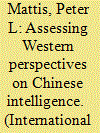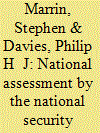| Srl | Item |
| 1 |
ID:
116381


|
|
|
|
|
| Publication |
2012.
|
| Summary/Abstract |
On 21 January 2011, a federal judge sentenced Glenn Duffie Shriver to four years in prison for conspiring to provide national defense information to Chinese intelligence. 1 The media coverage of the sentencing represented a stark contrast to Shriver's arrest-so quiet that not a single major U.S. newspaper covered the story in July 2010-and shows the growing U.S. awareness about the threat from Chinese intelligence operations. Shriver was the latest in a string of arrests going back to 2005 providing evidence to support U.S. counterintelligence officials' claims that the Chinese intelligence services have outstripped Russian intelligence as a threat to American national security.
|
|
|
|
|
|
|
|
|
|
|
|
|
|
|
|
| 2 |
ID:
157417


|
|
|
|
|
| Summary/Abstract |
During the Cold War, the United States and the Soviet Union faced off in an existential struggle between two antithetical systems. Either the Soviet bloc would “bury” the West, as Soviet Premier Nikita Khrushchev threatened in 1956, or Western principles of democratic accountability, individual rights, and the rule of law would triumph over Soviet totalitarianism. The eventual outcome—the demise of the Soviet system and the expansion of the U.S.-led international order—showed that military power is essential to American national security but also that the United States must advance its goals through the quiet resilience of democratic institutions and the attractive pull of alliances.
|
|
|
|
|
|
|
|
|
|
|
|
|
|
|
|
| 3 |
ID:
091748


|
|
|
|
|
| Publication |
2009.
|
| Summary/Abstract |
At a time of intense debate over the specific organizational arrangements of American national security agencies with new or refocused intelligence responsibilities, the relative proximity between intelligence producers and consumers is a key issue. Intelligence capabilities may have to be kept separate from decision-making because of organizational economies of scale and scope, but separation alone does not mean intelligence must be distant from decision-making. For example, the British style of analysis involves a much closer relationship between intelligence producers and consumers than exists in the American context. Efforts to improve the integration of intelligence into decision-making by closing the distance between them would do well to study the history and efficacy of this process as they look to create new ways of structuring the relationship between intelligence analysis and decision-making. Specifically, history demonstrates that the US National Security Council staff implemented a process in 1968 through 1980 that approximated the British style of analysis, and this may provide US policymakers with a model for bridging the gap between intelligence analysis and decision-making.
|
|
|
|
|
|
|
|
|
|
|
|
|
|
|
|
| 4 |
ID:
193541


|
|
|
|
|
| Summary/Abstract |
Contemporary debates surrounding emerging military technologies and international security tend to focus exclusively on the technical traits of such capabilities in an attempt to determine if, once operational, they will increase the likelihood of armed conflict in the future or not. This article argues, however, that the race to acquire the natural resources and information that are critical for developing, manufacturing, and operating emerging military technologies had become a major source of global discord and determinately contributed to the contemporary great power competition among the United States, China, and Russia.
|
|
|
|
|
|
|
|
|
|
|
|
|
|
|
|
| 5 |
ID:
171060


|
|
|